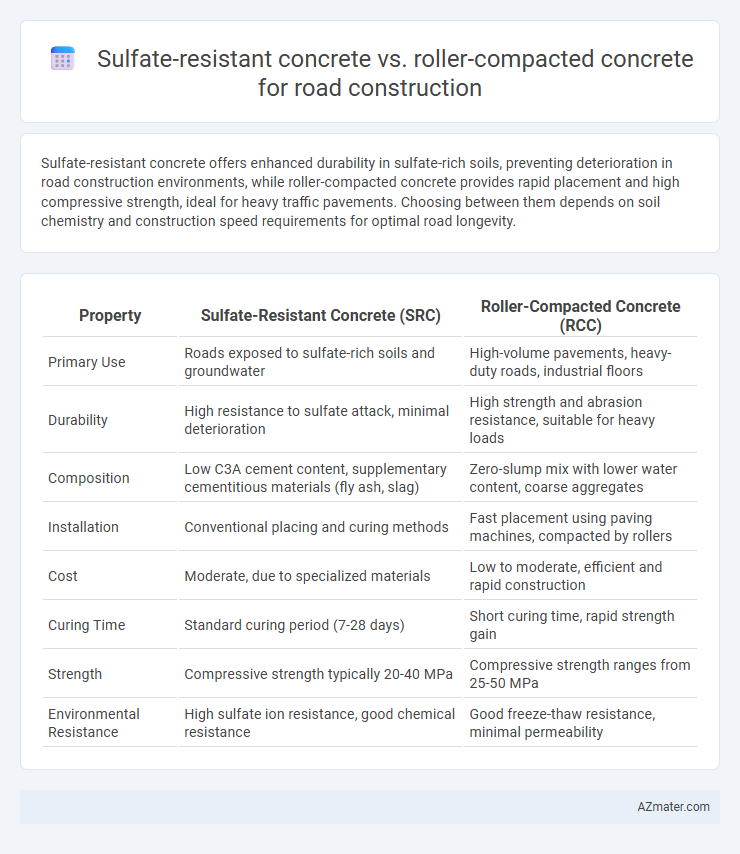Sulfate-resistant concrete offers enhanced durability in sulfate-rich soils, preventing deterioration in road construction environments, while roller-compacted concrete provides rapid placement and high compressive strength, ideal for heavy traffic pavements. Choosing between them depends on soil chemistry and construction speed requirements for optimal road longevity.
Table of Comparison
| Property | Sulfate-Resistant Concrete (SRC) | Roller-Compacted Concrete (RCC) |
|---|---|---|
| Primary Use | Roads exposed to sulfate-rich soils and groundwater | High-volume pavements, heavy-duty roads, industrial floors |
| Durability | High resistance to sulfate attack, minimal deterioration | High strength and abrasion resistance, suitable for heavy loads |
| Composition | Low C3A cement content, supplementary cementitious materials (fly ash, slag) | Zero-slump mix with lower water content, coarse aggregates |
| Installation | Conventional placing and curing methods | Fast placement using paving machines, compacted by rollers |
| Cost | Moderate, due to specialized materials | Low to moderate, efficient and rapid construction |
| Curing Time | Standard curing period (7-28 days) | Short curing time, rapid strength gain |
| Strength | Compressive strength typically 20-40 MPa | Compressive strength ranges from 25-50 MPa |
| Environmental Resistance | High sulfate ion resistance, good chemical resistance | Good freeze-thaw resistance, minimal permeability |
Introduction to Sulfate-Resistant and Roller-Compacted Concrete
Sulfate-resistant concrete is specifically formulated to withstand aggressive sulfate environments, making it ideal for road construction in areas with sulfate-rich soils or groundwater. Roller-compacted concrete (RCC) is a dry concrete mix compacted with rollers, providing high strength and durability with faster construction times for highways and heavy-duty pavements. Both materials enhance road longevity, but sulfate-resistant concrete primarily combats chemical degradation, whereas RCC emphasizes mechanical strength and rapid placement.
Key Composition Differences
Sulfate-resistant concrete incorporates low C3A (tricalcium aluminate) Portland cement and supplementary cementitious materials like fly ash or slag to enhance durability against sulfate attack, whereas roller-compacted concrete (RCC) uses a drier concrete mix with zero-slump consistency, featuring a higher coarse aggregate content for compactability and rapid placement. Sulfate-resistant concrete prioritizes chemical stability with reduced permeability, while RCC emphasizes mechanical interlock and density achieved through heavy compaction without conventional finishing. The distinct mixture proportions and cementitious material selection make sulfate-resistant concrete ideal for chemically aggressive environments, while RCC suits large-scale road construction requiring fast, cost-effective laying and high structural strength.
Strength and Durability Comparison
Sulfate-resistant concrete offers enhanced durability by resisting chemical attacks from sulfates in aggressive soil or groundwater, making it ideal for infrastructure exposed to harsh environmental conditions. Roller-compacted concrete is valued for its high compressive strength and rapid construction capabilities due to its dense, low-water mix applied with paving equipment, providing excellent load-bearing performance for roads. While sulfate-resistant concrete excels in chemical durability, roller-compacted concrete achieves superior mechanical strength and fast installation, allowing engineers to choose based on site-specific durability requirements and construction timelines.
Sulfate Resistance: Importance in Road Construction
Sulfate-resistant concrete is specifically designed to withstand chemical attacks from sulfates commonly found in soil and water, making it crucial for road construction in sulfate-rich environments to prevent deterioration and extend pavement lifespan. Roller-compacted concrete offers rapid construction and high compressive strength but may require additional sulfate-resistant admixtures when used in sulfate-prone areas to ensure durability. Selecting sulfate-resistant concrete ensures structural integrity in aggressive sulfate conditions, minimizing maintenance costs and enhancing road safety over time.
Construction Process and Application Methods
Sulfate-resistant concrete involves carefully selecting cement with low tricalcium aluminate content, mixed and cured to prevent sulfate attack in aggressive soils, making it ideal for road bases exposed to sulfates. Roller-compacted concrete (RCC) uses a dry mix placed with asphalt pavers and compacted by heavy rollers, enabling rapid construction and high-strength pavement suitable for highways and industrial roads. The construction process for sulfate-resistant concrete demands extended curing times and moisture control, while RCC emphasizes quick placement and compaction with minimal finishing.
Performance in Aggressive Environments
Sulfate-resistant concrete exhibits superior durability and chemical resistance in aggressive environments, effectively preventing deterioration caused by sulfate attack in soils and groundwater. Roller-compacted concrete provides rapid construction benefits with moderate sulfate resistance but requires additional admixtures or protective measures for long-term performance in highly aggressive conditions. Selecting sulfate-resistant concrete ensures enhanced longevity and reduced maintenance costs in sulfate-rich environments, making it the preferred choice for roads exposed to harsh chemical exposures.
Cost and Resource Efficiency
Sulfate-resistant concrete offers enhanced durability in sulfate-rich environments but typically incurs higher material costs due to specialized cement additives, impacting overall budget efficiency in road construction. Roller-compacted concrete (RCC) provides significant cost savings with faster placement and reduced cement content, optimizing resource use and lowering labor expenses. Choosing between sulfate-resistant concrete and RCC depends on balancing initial material cost against long-term performance requirements in sulfate-prone areas.
Maintenance Requirements and Longevity
Sulfate-resistant concrete substantially reduces deterioration in sulfate-rich soils, enhancing durability and lowering maintenance needs for road structures. Roller-compacted concrete (RCC) offers rapid construction and high compressive strength but may require more frequent surface sealing to prevent wear under heavy traffic. Choosing sulfate-resistant concrete improves long-term performance in aggressive environments, while RCC favors projects demanding quick installation and initial robustness.
Environmental Impact Considerations
Sulfate-resistant concrete minimizes environmental damage by preventing sulfate-induced deterioration, reducing the need for frequent repairs and associated resource consumption in road construction. Roller-compacted concrete (RCC) offers sustainable benefits through lower cement content and faster curing times, leading to decreased carbon emissions and energy use during production and placement. Choosing between the two depends on site-specific soil sulfate levels and the road's lifecycle environmental footprint.
Choosing the Right Concrete for Road Projects
Sulfate-resistant concrete proves essential for road construction in sulfate-rich soils, providing enhanced durability by preventing chemical reactions that lead to structural damage. Roller-compacted concrete (RCC) offers rapid construction and high compressive strength, suited for heavy traffic roads and cost-effective large-scale projects. Selecting the right concrete depends on environmental conditions, project timeline, and load requirements to ensure longevity and performance in road infrastructure.

Infographic: Sulfate-resistant concrete vs Roller-compacted concrete for Road construction
 azmater.com
azmater.com